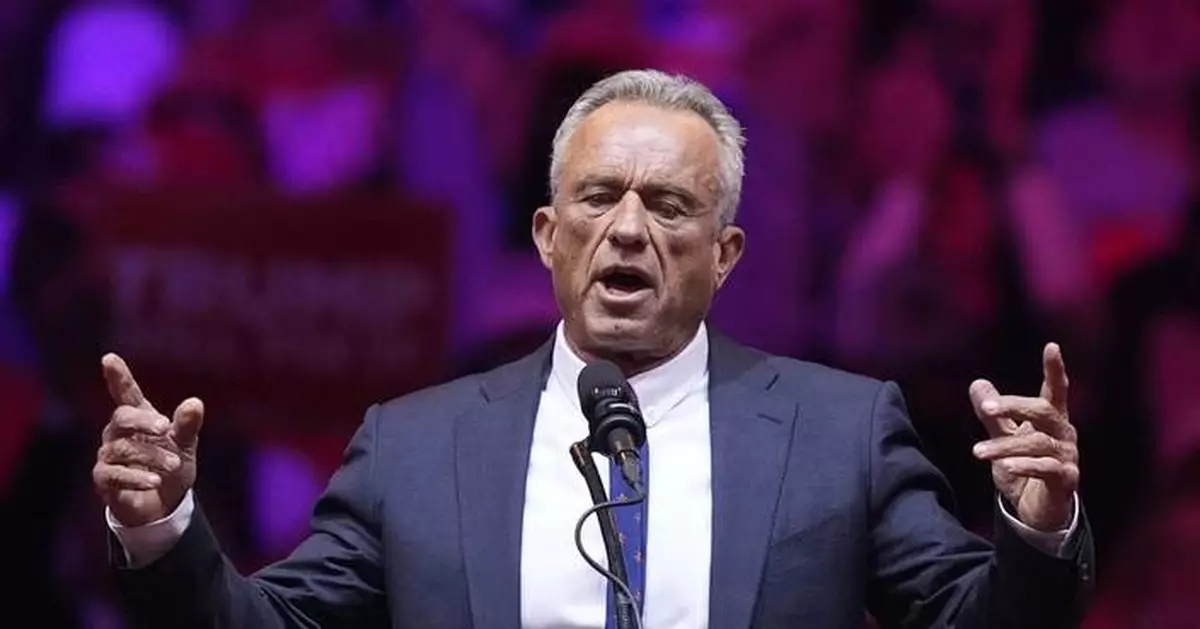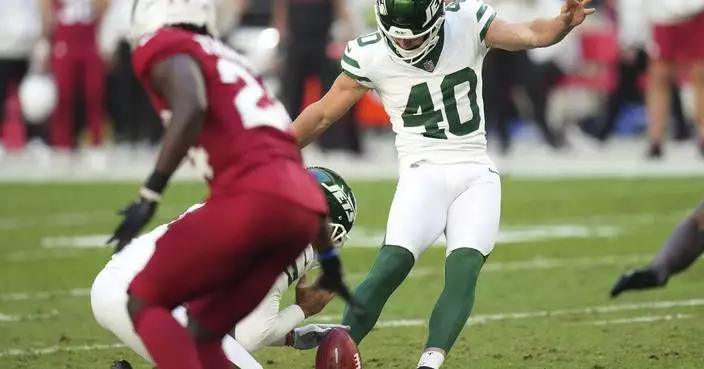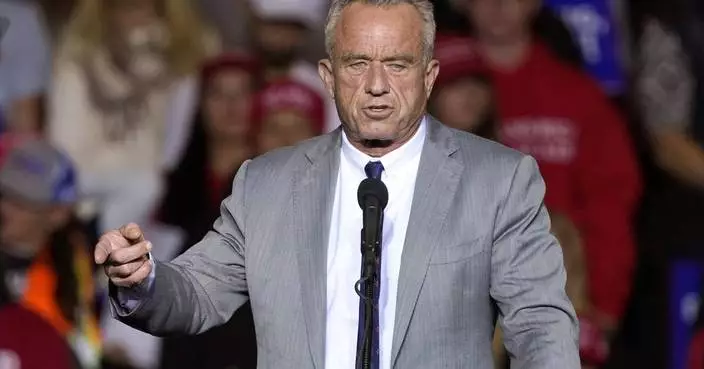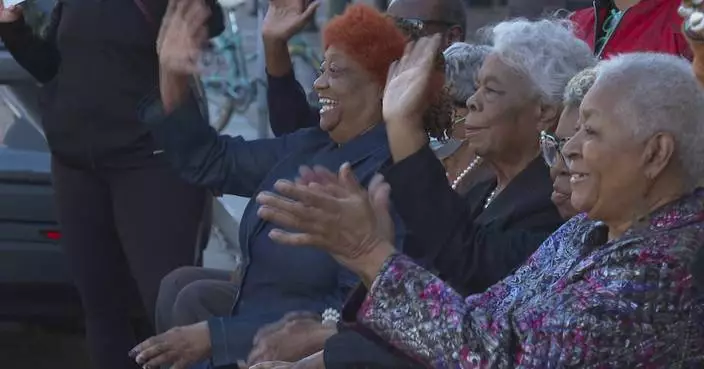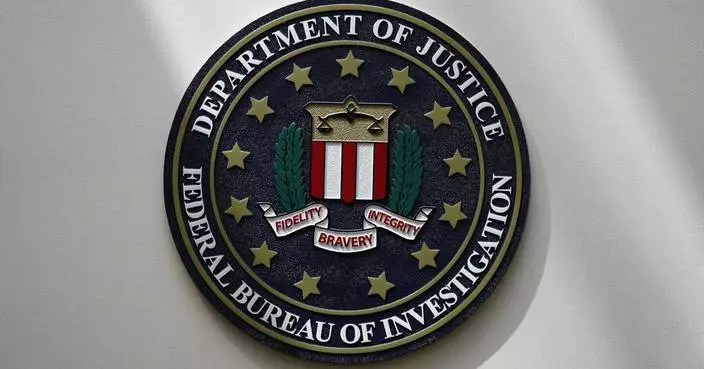President-elect Donald Trump 's plan to appoint Robert F. Kennedy Jr., to lead the Health and Human Services Department will put a prominent vaccine skeptic at the helm of the nation's sprawling public health apparatus.
A scion of a famous Democratic dynasty, Kennedy made a name in his own right as an environmental attorney who successfully took on large corporations including DuPont and Monsanto.
But over the past two decades, he's increasingly devoted his energy to promoting claims about vaccines that contradict the overwhelming consensus of scientists.
Trump would have Kennedy lead a massive Cabinet agency that oversees everything from drug, vaccine and food safety to medical research and the social safety net programs Medicare and Medicaid. He said before the election he would give Kennedy free rein over health policy.
Here's a look at Kennedy and the agency he'll be tasked with leading:
He took over the anti-vaccine group Children's Health Defense and built it into a juggernaut during the pandemic. His activism helped him build a loyal following that he's leveraged in his political pursuits.
Kennedy insists he is not anti-vaccine and claims he has never told the public to avoid vaccination. But he has repeatedly made his opposition to vaccines clear. He said on a podcast “there’s no vaccine that is safe and effective” and has urged people to resist CDC guidelines on when kids should get vaccinated.
While there are rare instances when people have severe reactions to vaccines, the billions of doses administered globally provide real-world evidence that they are safe. The World Health Organization says vaccines prevent as many as 5 million deaths each year.
He wants to eliminate liability protections for drug companies.
Even before Trump was elected, Kennedy said he would recommend water agencies stop adding fluoride to drinking water. Fluoride strengthens teeth and is viewed as one of the biggest public health successes of the past century.
He made a variety of other claims not backed by science, such as questioning whether HIV causes AIDS and suggesting antidepressants lead to school shootings.
Children’s Health Defense, currently has a lawsuit pending against a number of news organizations, among them The Associated Press, accusing them of violating antitrust laws by taking action to identify misinformation, including about COVID-19 and COVID-19 vaccines. Kennedy took leave from the group when he announced his run for president but is listed as one of its attorneys in the lawsuit.
Kennedy has promised to take a serious look at those who work for HHS and its agencies, including the Food and Drug Administration, the National Institutes of Health and the Centers for Disease Control and Prevention.
He is especially focused on putting an end to the “revolving door” of employees who have previous history working for pharmaceutical companies or leave government service to work for that industry, his campaign communications manager Del Bigtree told the AP last month. Bigtree is also an anti-vaccine organizer.
He said he wants to fire 600 employees at the National Institutes of Health, which oversees vaccine research, and replace them with 600 new employees.
Many of the scientists and researchers who work at the NIH are not political appointees, which makes firing them abruptly more difficult. Nevertheless, Kennedy made the promise at the Genius Network Annual Event in Scottsdale, Arizona, according to a video first obtained by ABC News.
“We need to act fast, and we want to have those people in place on Jan. 20, so that on Jan. 21, 600 people are going to walk into offices at NIH and 600 people are going to leave,” Kennedy said, according to a video of his remarks posted on YouTube.
He says the public health establishment is too focused on infectious diseases and wants to redirect resources toward panoply of problems he characterizes as the chronic disease epidemic, including obesity, diabetes, autism and mental illnesses. He blames them on greedy corporations including drug companies that worry healthy Americans would be bad for their bottom line and food producers using harmful pesticides and additives.
Kennedy's father was Attorney General Robert F. Kennedy, brother of President John F. Kennedy. Both men were assassinated.
Kennedy originally ran in the Democratic primary against President Joe Biden before deciding to launch an independent bid. He then suspended that campaign earlier this year and endorsed Trump, who has repeatedly praised Kennedy, promised him influence in a future administration, and vowed to “Make America Healthy Again.”
The GOP base has eagerly welcomed Kennedy since he joined forces with Trump, an embrace Kennedy never received from the Democratic Party. His anti-vaccine activism has alienated him from much of his famous family.
Doctors found a dead parasitic worm in Kennedy's brain and high levels of mercury that he said caused brain fog and memory problems.
He once retrieved a bear that was killed by a motorist and left it in New York’s Central Park with a bicycle on top, sparking a mystery that consumed the city in 2014. A photo showed Kennedy with his fingers in the bear’s bloodied mouth, a mock grimace on his face and an apparent bloodstain on his pantleg.
He denied eating a dog after a friend shared a photo with Vanity Fair showing Kennedy dramatically preparing to take a bite of a charred animal; Kennedy said it was a goat.
And a federal law enforcement agency opened an investigation after Kennedy allegedly cut off the head of a dead whale and took it home two decades ago. The National Marine Fisheries Service ended the probe a short time later.
Kennedy’s nomination is certain to be opposed by the pharmaceutical lobby in Washington, which relies on the predictability of FDA’s science-based rules to bring new medicines to market.
Kennedy’s proposals for the agency bear little resemblance to those of prior Republican administrations, which have typically favored cutting regulations to speed up product approvals.
Instead, Kennedy has suggested barring drugmakers from advertising on TV, a multibillion-dollar enterprise that accounts for most of the industry’s marketing dollars. He’s also proposed eliminating fees that drugmakers pay the FDA to review their products, allowing the agency to hire extra scientists to speed up their work. Replacing those funds would require billions in new appropriations from the federal budget.
In a post last month to the social media platform X, Kennedy vowed to end FDA’s “aggressive suppression” of a host of unsubstantiated therapies, including psychedelics and stem cells as well as discredited COVID-era drugs like ivermectin and hydroxychloroquine.
In recent interviews, Kennedy has also suggested clearing out “entire departments” at FDA, including the one responsible for nutrition standards.
The Kennedy pick was condemned by public health officials and some congressional Democrats.
“Robert F. Kennedy, Jr., is not remotely qualified for the role and should be nowhere near the science-based agencies that safeguard our nutrition, food safety, and health,” said Dr. Peter Lurie, president of the public health watchdog group Center for Science in the Public Interest.
But it also won some bipartisan support.
“Finally, someone to detox the place after the Fauci era,” Sen. Rand Paul, R-Kentucky, wrote on the social media platform X, referring to Anthony Fauci, the former leading public health official who has been demonized by people opposed to vaccines and the government's response to COVID-19.
Jared Polis, the Democratic governor of Colorado, said he was “excited” about Kennedy's appointment and said he would shake up HHS and the FDA.
“What I’m most optimistic about is taking on big pharma and the corporate ag oligopoly to improve our health,” Polis wrote on X. Facing backlash, he later added, “Science must remain THE cornerstone of our nation’s health policy.”
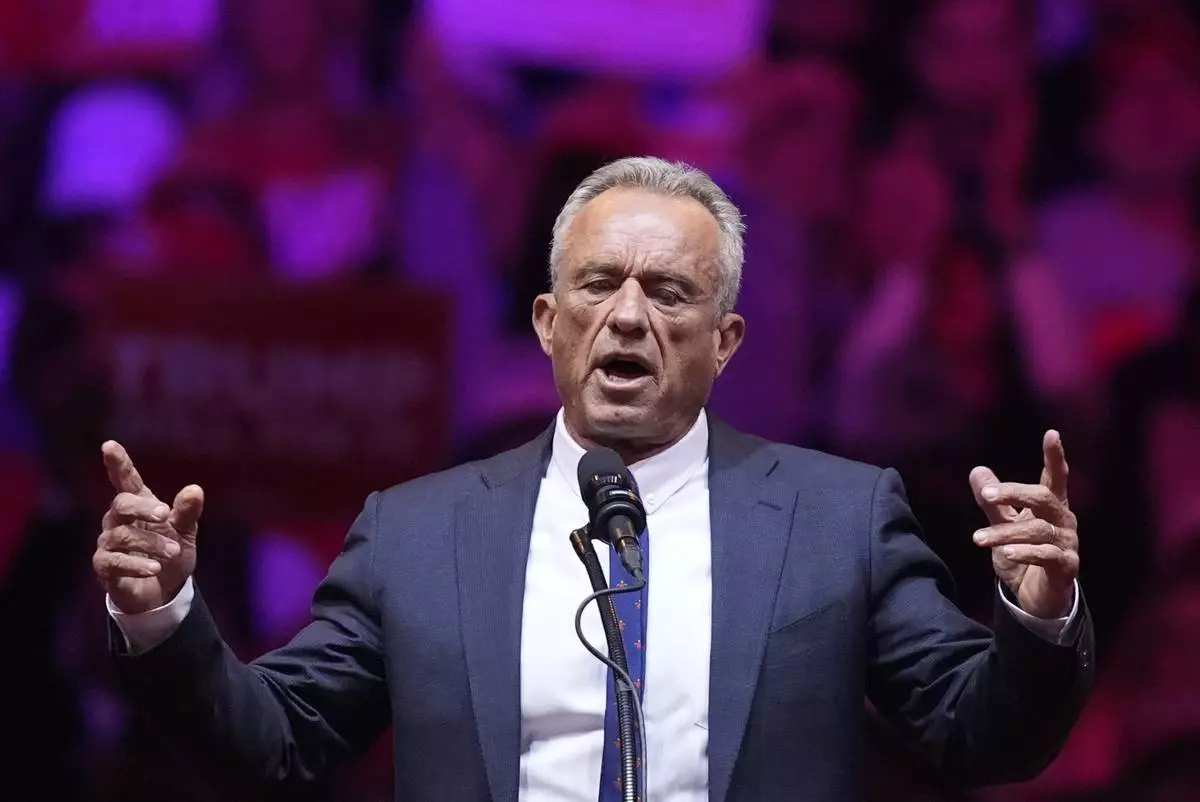
FILE - Robert F. Kennedy Jr., speaks before Republican presidential nominee former President Donald Trump at a campaign rally at Madison Square Garden, Oct. 27, 2024, in New York. (AP Photo/Evan Vucci, File)
NEW YORK (AP) — President-elect Donald Trump says he will nominate anti-vaccine activist Robert F. Kennedy Jr. to lead the Department of Health and Human Services, putting a man whose views public health officials have decried as dangerous in charge of a massive agency that oversees everything from drug, vaccine and food safety to medical research and the social safety net programs Medicare and Medicaid.
“For too long, Americans have been crushed by the industrial food complex and drug companies who have engaged in deception, misinformation, and disinformation when it comes to Public Health,” Trump said Thursday in a post on his Truth Social site announcing the appointment. Kennedy, he said, would “end the Chronic Disease epidemic" and “Make America Great and Healthy Again!”
Kennedy is one of the most prominent anti-vaccine activists in the world and has long advanced the debunked idea that vaccines cause autism and other health issues.
Trump also announced Thursday that he has chosen Doug Collins, a former congressman from Georgia, to run the Department of Veterans Affairs. Collins is a chaplain in the U.S. Air Force Reserve Command. The Republican served in Congress from 2013 to 2021, and he helped defend Trump during his first impeachment process.
Hailing from one of the nation's most storied political families, Kennedy is the son of the late Attorney General Robert F. Kennedy and the nephew of President John F. Kennedy. He first challenged President Joe Biden for the Democratic nomination last year. He then ran as an independent before abandoning his bid after striking a deal to give Trump his endorsement with a promise to have a role overseeing health policy in a second Trump administration.
He and the president-elect have since become good friends. The two campaigned together extensively during the race's final stretch, and Trump had made clear he intended to give Kennedy a major role overseeing public health as part of a campaign to "Make America Healthy Again.”
“I'm going to let him go wild on health," Trump said at a rally last month.
During his victory speech in Palm Beach, Florida, last week, Trump exclaimed, "Go have a good time, Bobby!”
Still, it was unclear precisely what job he would be offered. In an October interview on CNN, Trump transition co-chair Howard Lutnick assured there was no way Kennedy would receive the job he got.
The appointment drew alarms from public health experts.
“Robert F. Kennedy, Jr., is not remotely qualified for the role and should be nowhere near the science-based agencies that safeguard our nutrition, food safety, and health,” said Dr. Peter Lurie, president of the public health watchdog group Center for Science in the Public Interest.
Dr. Mandy Cohen, director of the Centers for Disease Control and Prevention, told The Associated Press, “I don’t want to go backwards and see children or adults suffer or lose their lives to remind us that vaccines work, and so I am concerned."
“Any misinformation coming from places of influence, of power, are concerning," she said.
During the campaign, Kennedy told NewsNation that Trump had asked him to “reorganize” agencies including the CDC, the National Institutes of Health and the Food and Drug Administration.
Kennedy has pushed against processed foods and the use of herbicides like Roundup weed killer. He has long criticized the large commercial farms and animal feeding operations that dominate the industry.
But he is perhaps best known for his criticism of childhood vaccines.
Again and again, Kennedy has made his opposition to vaccines clear. In July, he said in a podcast interview that “There’s no vaccine that is safe and effective” and told FOX News that he still believes in the long-ago debunked idea that vaccines can cause autism.
In a 2021 podcast he urged people to “resist” CDC guidelines that advise when kids should receive routine vaccinations.
“I see somebody on a hiking trail carrying a little baby and I say to him, ‘Better not get them vaccinated,’” Kennedy said.
Repeated scientific studies in the U.S. and abroad have found no link between vaccines and autism. Vaccines have been proven safe and effective in laboratory testing and in real world use in hundreds of millions of people over decades. The World Health Organization credits childhood vaccines with preventing as many as 5 million deaths a year
Trump during his first term launched Operation Warp Speed, an effort to speed the production and distribution of a vaccine to combat COVID-19. The resulting vaccines were widely credited, including by Trump himself, with saving many lives.
Trump, in his announcement, said that, under Kennedy, HHS would "play a big role in helping ensure that everybody will be protected from harmful chemicals, pollutants, pesticides, pharmaceutical products, and food additives that have contributed to the overwhelming Health Crisis in this Country.” But HHS does not have jurisdiction over many of those issues, which fall under the purview of the Environmental Protection Agency and Department of Agriculture.
Kennedy is an attorney who has built a loyal following over several decades of people who admire his lawsuits against major pesticide and pharmaceutical companies. He has pushed for tighter regulations around the ingredients in foods.
With the Trump campaign, he worked to shore up support among young mothers in particular, with his message of making food more healthful in the U.S., promising to model regulations after those imposed in Europe. In a nod to Trump’s original campaign slogan, he named the effort “Make America Healthy Again.”
It remains unclear how that will square with Trump’s history of deregulation of big industries, including food. Trump has pushed for fewer inspections of the meat industry, for example.
Kennedy’s stance on vaccines raises question about his ability to get confirmed, even in a GOP-controlled Senate.
He also has said he would recommend removing fluoride from drinking water, although fluoride levels are mandated by state and local governments. The addition of the material has been cited as leading to improved dental health and is considered safe at low levels.
He has said he would seek to ban certain food additives, cracking down on substances such as food dyes and preservatives, which are regulated by the Food and Drug Administration. He has also targeted pesticides, which are jointly regulated by the Environmental Protection Agency and the FDA.
Kennedy has also drawn headlines for his history with wild animals. He admitted to dumping a dead bear in New York’s Central Park — placing it as though it had been hit by a bike — and found himself the subject of a federal probe after his daughter revealed that he had cut off a beached whale’s head and strapped it to the roof of his car to take home.
HHS has more than 80,000 employees across the country. Kennedy has promised to take a serious look at those who work for HHS and its agencies, including the Food and Drug Administration, the National Institutes of Health and the CDC.
He has said he is especially focused on putting an end to the “revolving door” of employees who have previous history working for pharmaceutical companies or leave government service to work for that industry, his former campaign communications manager, Del Bigtree, told the AP last month. Bigtree is also an anti-vaccine organizer.
Kennedy said he wanted to fire 600 employees at the National Institutes of Health, which oversees vaccine research.
The expected appointment was first reported by Politico Thursday.
Kennedy’s anti-vaccine nonprofit group, Children’s Health Defense, currently has a lawsuit pending against a number of news organizations, among them The Associated Press, accusing them of violating antitrust laws by taking action to identify misinformation, including about COVID-19 and COVID-19 vaccines. Kennedy took leave from the group when he announced his run for president but is listed as one of its attorneys in the lawsuit.
Trump also announced Thursday that he will nominate Jay Clayton, who served as chairman of the U.S. Securities and Exchange Commission during his first term, to serve as U.S. Attorney for the Southern District of New York.
__ Seitz reported from Washington. Associated Press writer Zeke Miller in Washington and JoNel Aleccia in Temecula, California contributed to this report.
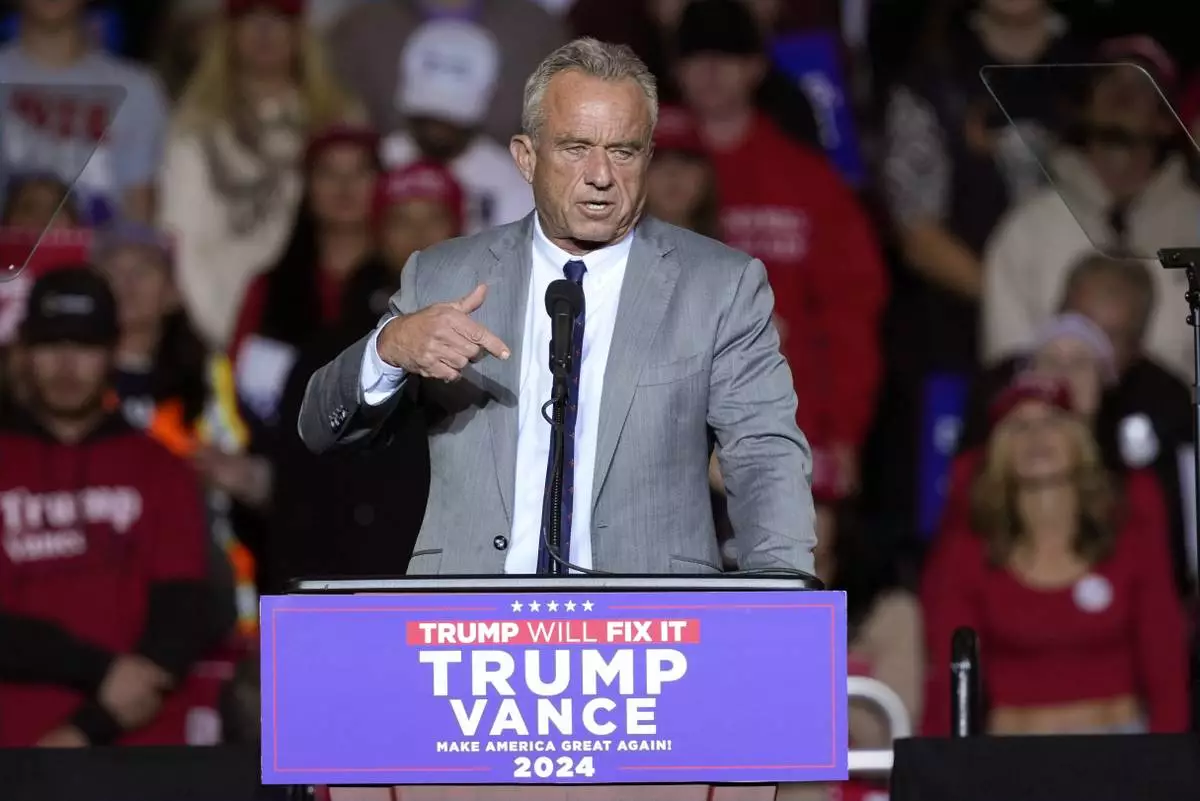
Robert F. Kennedy Jr., speaks before Republican presidential nominee former President Donald Trump at a campaign event Friday, Nov. 1, 2024, in Milwaukee. (AP Photo/Morry Gash)
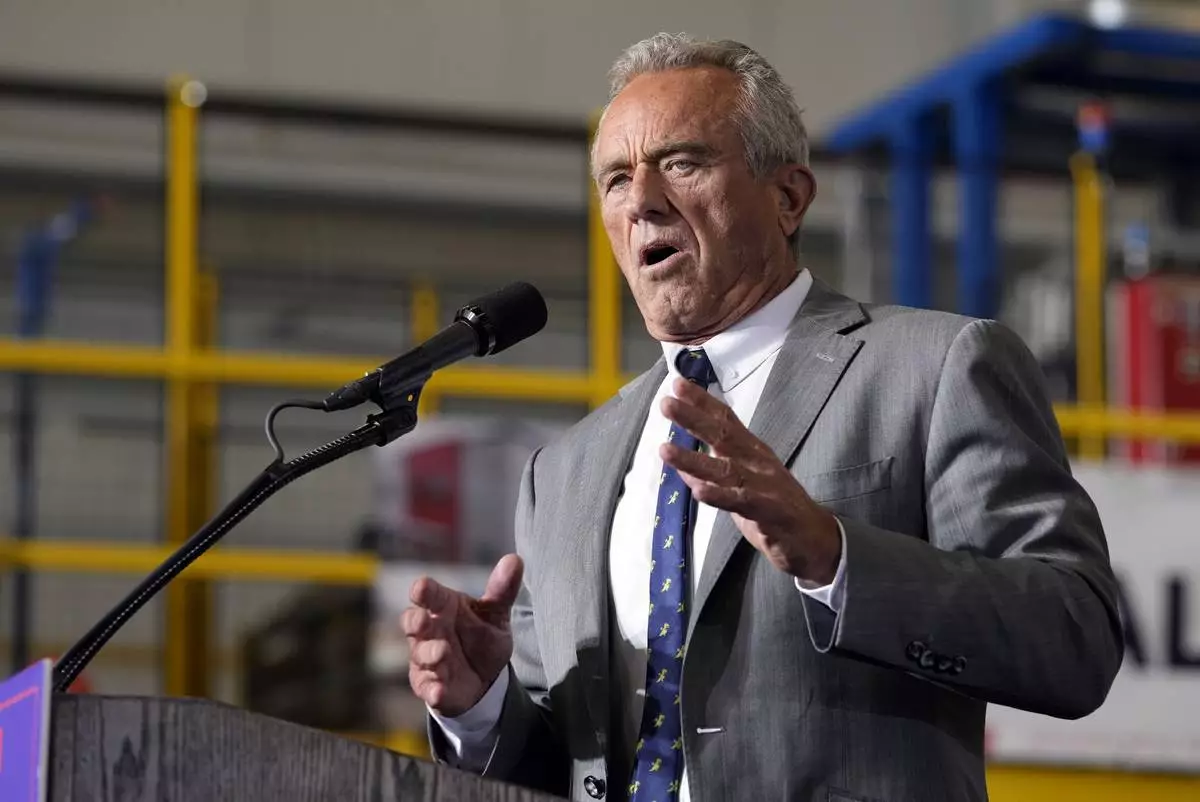
FILE - Robert F. Kennedy, Jr., speaks before Republican presidential nominee former President Donald Trump at a campaign event, Sept. 27, 2024 in Walker, Mich. (AP Photo/Carlos Osorio)



